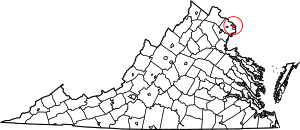Potomac, Virginia
|
Town of Potomac | |
|
| |
|
Commercial building on Mt. Vernon Ave. | |
 | |
| Location | Roughly bounded by Commonwealth Ave., US 1, E. Bellefonte Ave. and Ashby St., Alexandria, Virginia |
|---|---|
| Coordinates | 38°49′37″N 77°3′24″W / 38.82694°N 77.05667°WCoordinates: 38°49′37″N 77°3′24″W / 38.82694°N 77.05667°W |
| Area | 184 acres (74 ha) |
| Built | 1894 |
| Architect | Multiple |
| Architectural style | Colonial Revival, Bungalow/Craftsman, Queen Anne |
| NRHP Reference # | 92001186[1] |
| VLR # | 100-0136 |
| Significant dates | |
| Added to NRHP | September 10, 1992 |
| Designated VLR | December 11, 1991[2] |
Potomac, Virginia, is an extinct incorporated town formerly located in Arlington County, Virginia (then called Alexandria County). A planned community, its proximity to Washington D.C. made it a popular place for employees of the U.S. government to live. Potomac was located adjacent to the massive Potomac Yard of the Richmond, Fredericksburg and Potomac Railroad.
History
The area was developed beginning in 1894 as the communities of Del Ray, St. Elmo, Mt. Ida, and Hume, following a grid plan independent of that of Old Town Alexandria. Potomac was incorporated as a town in 1908. In 1928, the town had 2,355 residents.
The Town of Potomac was annexed by the independent city of Alexandria in 1930. Today, the Town of Potomac Historic District in Alexandria designates this historic portion of the city, and includes 1,840 acres (7.4 km2) and 690 buildings. The Town of Potomac was added to the National Register of Historic Places in 1992.
As of 2010, the United States Postal Service still recognizes "Potomac, VA" as an acceptable alternate address for ZIP code 22301, although "Alexandria, VA" is preferred.
See also
References
- ↑ Staff (2009-03-13). "National Register Information System". National Register of Historic Places. National Park Service.
- ↑ "Virginia Landmarks Register". Virginia Department of Historic Resources. Retrieved 2013-05-12.
External links
- City of Alexandria, official web site
- Del Ray History, from the Del Ray Citizens Association
- Lynhaven History, from the Lynhaven Citizens Association
| |||||||||||||


